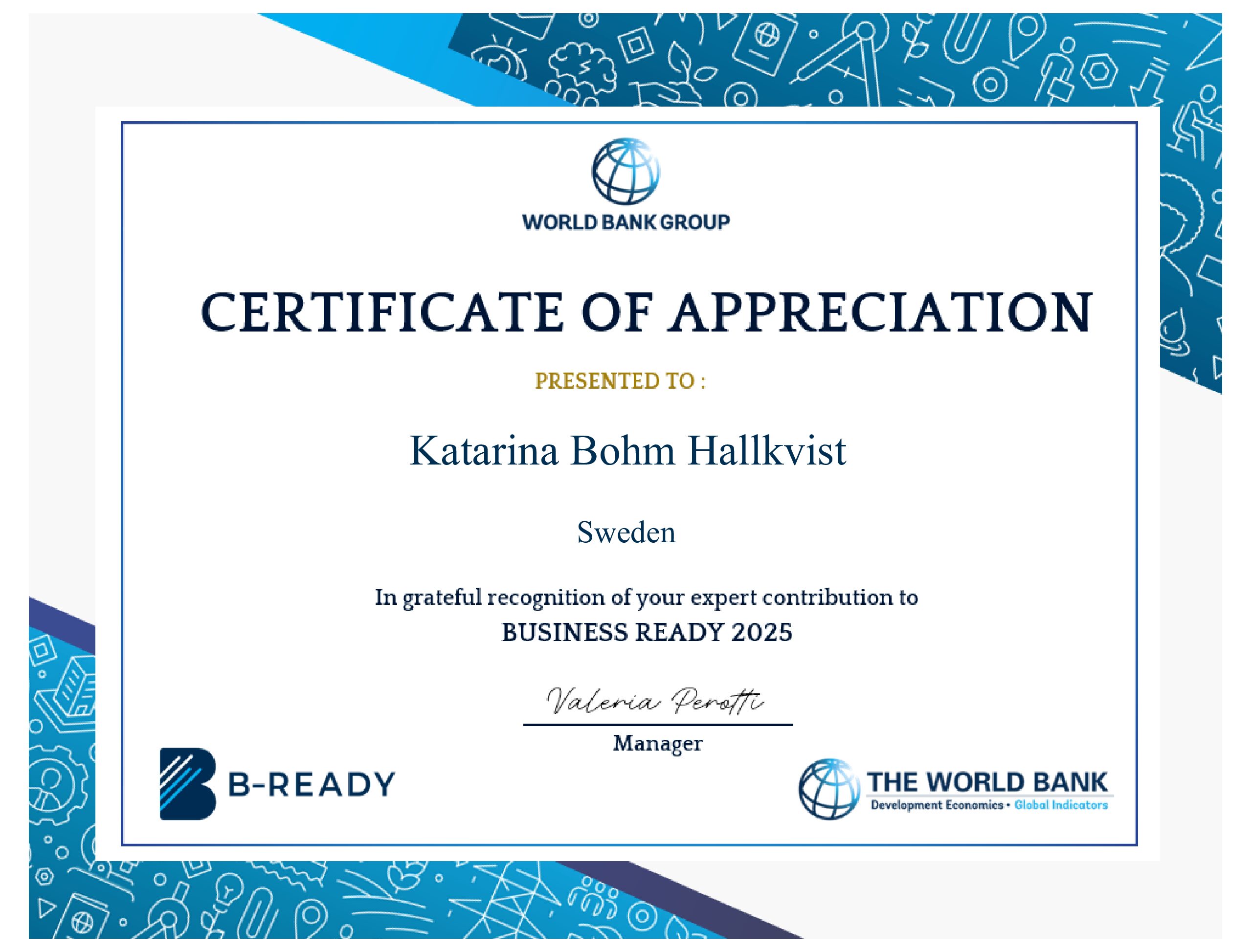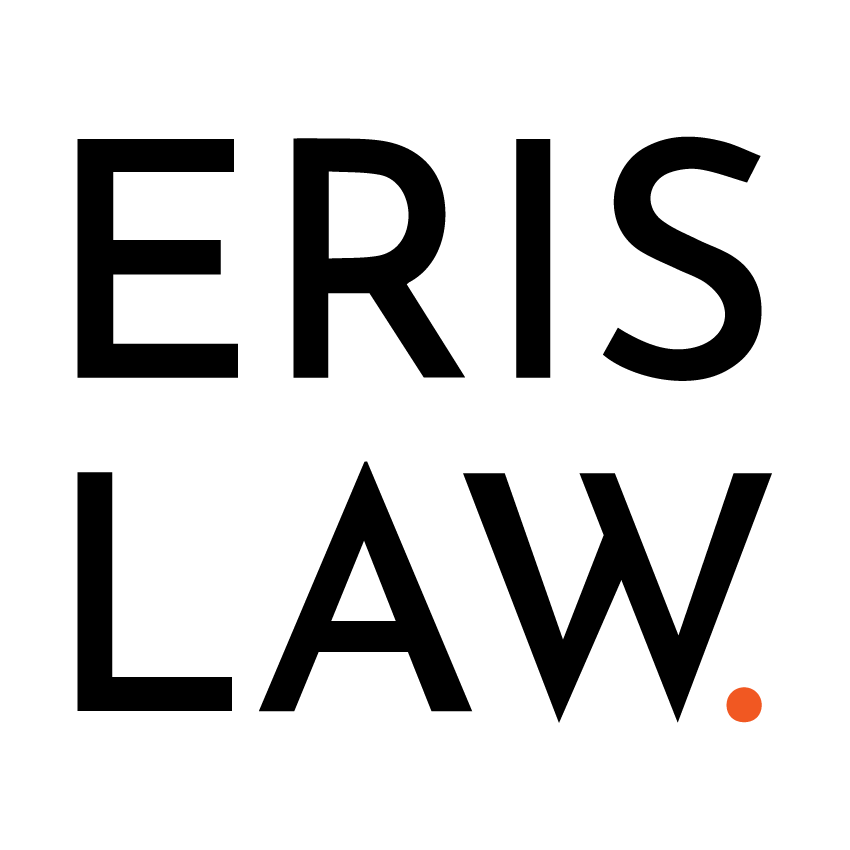What’s New at Eris Law Advokatbyrå AB
We are proud to share that our very own Katarina Bohm Hallkvist has been recognized by the World Bank for her expert contribution to the Business Ready 2025 (B-READY) initiative. This global program, led by the World Bank’s Development Economics Global Indicators Group, aims to improve the business environment worldwide by providing data-driven insights and policy recommendations.
Katarina Bohm Hallkvist ’s involvement reflects Eris Law Advokatbyrå AB’s commitment to advancing legal and regulatory frameworks that support sustainable economic development. Her participation in B-READY not only highlights our firm’s international engagement but also reinforces our dedication to excellence and thought leadership in the legal sector.
We are honored to be part of this important global effort and look forward to continuing our work in shaping a more business-friendly world.

Fintech
Klarna CEO Emphasizes Human Touch as Premium Amid AI-Driven Efficiency: At London SXSW, Klarna CEO Sebastian Siemiatkowski highlighted the company’s strategy to integrate human customer service as a premium ”VIP” offering, even as AI handles routine tasks. While AI has enabled Klarna to reduce its workforce from 5,500 to around 3,000 employees, leading to increased revenue per employee, the company plans to reinvest savings into employee compensation. Siemiatkowski envisions a future where business-savvy individuals who can code will be highly valuable, and he personally uses AI tools like ChatGPT to enhance his technical understanding. Additionally, he expressed concerns about AI’s role in facilitating scams, particularly in high-trust societies like Sweden.
Thunes Expands Real-Time Cross-Border Payouts to Nordic Countries: Thunes, a global payments platform, has extended its Direct Global Network to include Denmark, Norway, and Sweden, enabling real-time cross-border payouts to bank accounts in these Nordic countries. This expansion aims to enhance the efficiency of international transactions for businesses and individuals operating in the region. By integrating with local banking systems, Thunes facilitates faster and more reliable fund transfers, aligning with the growing demand for seamless global payment solutions. The move underscores Thunes’ commitment to broadening its reach and improving financial connectivity worldwide.
Ikano Bank Launches TCS BaNCS Core Banking System in Sweden as Part of Pan-European Digital Overhaul: Ikano Bank has successfully implemented the TCS BaNCS core banking platform in Sweden, marking a significant milestone in its extensive digital transformation initiative. This new system, delivered on a Software-as-a-Service (SaaS) basis, replaces multiple legacy solutions and is poised to enhance the bank’s efficiency and scalability across its European operations. The rollout in Sweden is the first phase of a broader strategy to deploy the TCS BaNCS platform across Ikano Bank’s presence in Denmark, Finland, Norway, the UK, Poland, Germany, and Austria. Chief Digital Officer Mikael Andersson described the go-live as the bank’s ”largest and most complex” to date, emphasizing its readiness to scale with speed, resilience, and flexibility for the future.
GDPR
German Court Declines Interim Ban on Meta AI: A German court in Cologne declined to grant an interim injunction requested by Verbraucherzentrale NRW, which sought to prevent Meta from using decades of user data without consent to train its AI systems. The court’s decision does not preclude a different outcome in the main proceedings, where the legality of Meta’s data practices under the GDPR will be fully examined. Meanwhile, the Hamburg Data Protection Authority has initiated an ”urgency procedure” under Article 66 of the GDPR against Meta and its lead regulator, the Irish Data Protection Commission, potentially compelling a halt to Meta’s AI training activities. Privacy advocacy group noyb is considering similar legal action at the EU level, and if Meta’s approach is ultimately deemed unlawful, it could face damage claims from up to 400 million European users.
Polish Authorities Fined for Unlawful Processing of Citizens’ Data During 2020 Postal Election Preparations: In April 2020, the Polish Minister of Digitalisation provided Polish Post S.A. with personal data of approximately 30 million citizens from the PESEL register to facilitate postal voting for the presidential election. Subsequent legal challenges led to rulings by the Provincial Administrative Court and the Supreme Administrative Court, which found no legal basis for the data transfer and deemed the Minister’s actions ineffective. In 2025, the Polish Data Protection Authority (UODO) concluded that both the Minister and Polish Post acted as data controllers and violated the GDPR by processing personal data without a lawful basis. Consequently, UODO imposed fines of PLN 100,000 on the Minister and PLN 27,124,816 on Polish Post S.A. for these infringements.
Italian Data Protection Authority Fines Replika AI €5 Million for GDPR Violations: In May 2025, the Italian Data Protection Authority (Garante) fined Luka Inc., the provider of the AI chatbot Replika, €5 million for unlawfully processing personal data, lacking transparency, and failing to implement effective age verification measures. The investigation was initiated after reports emerged that Replika encouraged minors to engage in self-harm, leading the Garante to temporarily halt its data processing in Italy in early 2023. Despite subsequent modifications, the Garante found that Replika’s privacy notice remained insufficiently clear regarding legal bases for data processing and failed to adequately prevent minors from accessing the service. The authority concluded that the company’s operations fell within the scope of the GDPR and that it had jurisdiction to enforce compliance, rejecting Luka Inc.’s claims of oversight by another EU supervisory authority.
Telecom
Eutelsat OneWeb Secures South Korean Approval for LEO Satellite Internet Services: Eutelsat OneWeb has received regulatory approval from South Korea’s Ministry of Science and ICT to provide Low Earth Orbit (LEO) satellite internet services, marking the country’s first cross-border satellite internet license. This authorization enables OneWeb to offer high-speed connectivity across various sectors, including maritime, defense, government, and enterprise markets in South Korea. The deployment will be supported by Intellian Technologies, a South Korean company and OneWeb’s largest global terminal supplier, which will provide locally manufactured user terminals. This development underscores South Korea’s commitment to next-generation connectivity and positions the nation as a leader in LEO-based innovation.
Ericsson Deploys Private 5G Network in Istres to Enhance Public Safety and Urban Innovation: Ericsson, in collaboration with SPIE and Unitel, has implemented a private 5G network in Istres, France, aimed at improving emergency response coordination and enabling advanced urban services. This initiative positions Istres as one of the first mid-sized European cities to adopt a sovereign private 5G infrastructure supporting critical communications and AI-driven solutions. The deployment offers significant cost savings, reducing per-camera installation expenses from €30,000 with traditional fiber setups to €5,000 using 5G technology. Mayor François Bernardini emphasized that this project lays the groundwork for next-generation public services that are more connected, responsive, and tailored to citizens’ needs.
Telstra Launches Australia’s First Satellite-to-Mobile Text Messaging Service: Telstra has introduced ”Telstra Satellite Messaging,” Australia’s inaugural satellite-to-mobile text messaging service, developed in partnership with SpaceX’s Starlink Direct to Cell technology. The service enables users with compatible devices, such as the Samsung Galaxy S25 series, to send and receive text messages and emojis in areas lacking traditional mobile coverage, provided they have a clear line of sight to the sky. Currently limited to text messaging, Telstra plans to expand the service to include voice calls and data capabilities in the future. This initiative aims to enhance connectivity for individuals in remote and regional parts of Australia, offering a vital communication option in areas previously considered unreachable.
AI
Build Generative AI Apps in Under 60 Seconds with Vertex AI: Google Cloud has introduced a new feature in Vertex AI that allows users to instantly deploy generative AI prompts as interactive web apps using a one-click “Deploy as App” button. This streamlined process eliminates the need for complex infrastructure setup by integrating with Cloud Run, automatically generating a user interface and hosting the app. Developers can quickly iterate, customize access settings, and share live app links, making it easier than ever to turn AI ideas into functional prototypes.
Confidential Computing Lays the Foundation for Trusted AI: Google Cloud highlights how Confidential Computing is transforming AI security by enabling sensitive data to be processed securely in the cloud. Through partnerships with Intel, AMD, and NVIDIA, Google has expanded hardware-based protections to GPUs, supporting privacy-preserving AI and secure multi-party analytics. New offerings like Confidential VMs and GKE nodes with NVIDIA H100 GPUs help ensure data confidentiality and integrity during AI model training and inference, especially in regulated and collaborative environments.
EU Tech VP Henna Virkkunen Visits Sweden to Advance Digital Innovation: Executive Vice-President Henna Virkkunen visited Stockholm on May 30–31, 2025, to meet with Swedish government officials and industry leaders to discuss digitalization and emerging technologies. Her agenda included a visit to Ericsson’s Imagine Studio to explore 5G, AI, and augmented reality applications, followed by discussions with Minister Erik Slottner on public sector digital transformation. The visit concluded with a tour of MIMER, an AI Factory under development, which will provide advanced computing resources for AI model development in sectors like gaming, life sciences, and autonomous systems
Cybersecurity
Cybercriminals Exploit Fake AI Websites to Spread Malware: Google Cloud’s Mandiant team has uncovered a widespread cyber campaign by threat group UNC6032, which uses fake AI video generator websites to distribute malware. These fraudulent sites, promoted through deceptive ads on platforms like Facebook and LinkedIn, lure users into downloading infostealers and backdoors disguised as legitimate AI tools. The campaign, active since mid-2024, has compromised victims globally, exfiltrating sensitive data such as credentials and credit card information via the Telegram API.
FI Reviews Financial Sector’s Digital Operational Resilience: Finansinspektionen (FI) has launched a review in 2025 to assess how financial institutions are implementing the EU’s Digital Operational Resilience Act (DORA). The initiative aims to evaluate the sector’s preparedness for cyber threats and ensure robust digital infrastructure. This review is part of FI’s broader strategy to strengthen oversight and enhance the resilience of Sweden’s financial system against operational disruptions.
ENISA Launches Updated Interactive Map for EU Cybersecurity Strategies: ENISA has unveiled an updated version of its National Cybersecurity Strategies (NCSS) Interactive Map, offering a comprehensive overview of how EU Member States are implementing cybersecurity policies. The platform highlights strategic objectives, implementation efforts, and key actors such as CSIRTs and national authorities, aligning with the NIS2 Directive. Designed to foster transparency and collaboration, the map serves as a dynamic tool for policymakers, researchers, and stakeholders to track and strengthen cybersecurity across the EU.
Intellectual Property
New Swedish Law on Geographical Indications and International Trademarks Proposed: The Swedish government has proposed a new law to complement the EU regulation on the protection of geographical indications for craft and industrial products. The proposal includes transferring application responsibilities to the EU Intellectual Property Office and assigning the Swedish Patent and Registration Office to oversee compliance. It also introduces legal sanctions for misuse and updates existing laws to simplify the handling of international trademarks and intergovernmental organization designations, with the changes set to take effect on December 1, 2025.
2025 EUIPO Guidelines Introduce Major Updates to Design Examination: The 2025 edition of the EUIPO Guidelines for Examination of registered European Union designs came into force on May 1, 2025, introducing several significant changes. Key updates include the removal of filing via national offices, the elimination of specimen submissions, revised terminology, and a new fee structure that simplifies application and renewal processes. These reforms aim to modernize and streamline design registration procedures, enhancing clarity and efficiency for users across the EU.
EUIPO Expands Mediation Services to All Trademark and Design Disputes: As of June 2, 2025, the EUIPO has extended its mediation services to cover all inter partes proceedings involving EU trade marks (EUTMs) and registered EU designs (EUDs). This includes both first and second instance opposition, cancellation, and invalidity proceedings, offering parties a voluntary, free, and fully online alternative dispute resolution (ADR) process. The initiative aims to promote faster, more cost-effective, and cooperative resolutions, and supports the EUIPO’s broader strategy to enhance access to justice and legal certainty in intellectual property disputes
Tariffs &Trade War
US Federal Court Blocks Trump’s Sweeping Tariffs, Citing Presidential Overreach: A federal trade court has ruled that President Donald Trump exceeded his authority by imposing extensive tariffs under the International Emergency Economic Powers Act (IEEPA), stating that the law does not grant the president unlimited tariff-setting powers. The court emphasized that while the president can address trade deficits under the Trade Act of 1974, such measures are limited to a 15% rate for a maximum of 150 days. The administration has appealed the decision, and the tariffs remain in effect pending the outcome. This ruling introduces significant legal uncertainty into Trump’s trade policies, which have already prompted global retaliation and disrupted international markets.
CBO: Trump’s Tariff Plan Would Slash Deficit by $2.8 Trillion but Hurt U.S. Economy: The Congressional Budget Office (CBO) estimates that President Donald Trump’s proposed broad tariffs could reduce the U.S. federal deficit by $2.8 trillion over the next decade. However, the CBO warns that these tariffs would likely increase inflation by 0.4 percentage points in 2025 and 2026, diminish household purchasing power, and slow GDP growth by 0.06 percentage points annually. The analysis assumes the tariffs, enacted through executive orders, would remain permanently in place, though legal challenges have introduced uncertainty. Other economic models, such as the Penn Wharton Budget Model, predict even more severe impacts, including a 6% reduction in GDP and a 5% drop in wages.
Trump Doubles Steel and Aluminum Tariffs to 50%, Prompting Global Trade Tensions: On June 4, 2025, President Donald Trump implemented a significant increase in tariffs on imported steel and aluminum, raising rates from 25% to 50% under Section 232 of the Trade Expansion Act, citing national security concerns. While the administration argues that these measures will bolster domestic industries, experts warn of potential price hikes on consumer goods and disruptions in manufacturing sectors reliant on these metals. Key trading partners, including Canada and Mexico, have expressed strong opposition, with Canada preparing retaliatory tariffs and Mexico seeking exemptions. The move has intensified global trade tensions and added uncertainty to international economic relations.
Upcoming Events
- International IP Enforcement Summit 2025
Date: June 12 & 13, 2025
Time: 9:00 am – 02:30 pm
Location: Megaron Concert Hall in Athens, Greece
Registration: Link
- Intellectual property for deep-tech businesses – IP strategy day
Date: June 11, 2025
Time: 02:00 pm – 05:00 pm
Location: Online
Registration: Link
- Annual Privacy Forum (APF) 2025
Date: Oct 22 – 23, 2025
Time: 9:30 am – 4:30 pm
Location: ExCeL London, UK
Registration: Link
Meet The Team

Katarina Bohm Hallkvist
Editor-in-Chief

Andres Alma
Reporteur

Ariunzaya Munkhbat
Reporteur

